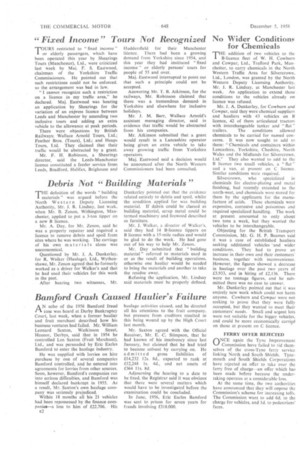Debris Not "Building Materials"
Page 46

If you've noticed an error in this article please click here to report it so we can fix it.
THE definition of the words "building materials" was argued before the
North We Deputy Licensing Authority, Mr. J. R. Lindsay, last week, when Mr. B. Zenon, Withington, Manchester, applied to put a 3-ton tipper on a new B licence.
Mr. A. Day, for Mr. Zenon. said he was a property repairer and required a licence to remove debris and spoil from sites where he was working. The carriage of his own materials alone was uneconomical.
Questioned by Mr. J. A. Dunkerley, for R. Walker (Haulage), Ltd., Wythenshawe, Mr. Zenon agreed that he formerly worked as a driver for Walker's and that he had used their vehicles for this work in the past.
After hearing two witnesses, Mr. Dunkerley pointed out that the evidence related entirely to debris and spoil, whilst the condition applied for was building material. If debris could be classed as building material, scrap metal could be termed machinery and firewood described as furniture.
Mr. J. Walker, a director of Walker's, said they had 14 B-licence tippers on B licence with a 15-mile radius and would be glad to do the work. lie had gone out of his way to help Mr. Zenon.
Mr. Day submitted that "building material " referred to materials used in or as the result of building operations, otherwise one haulier would be needed to bring the materials and another to take the residue away.
Refusing the application, Mr. Lindsay said materials must be properly defined.
























































































































